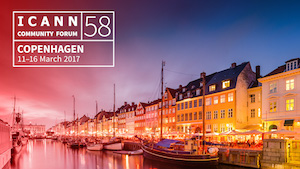GNSO-GAC facilitated dialogue on IGO and Red Cross protections (Session 2)
23 Mar 2017 01:00h
Event report
The session was dedicated to the discussion of how to protect the acronyms of International Governmental Organisations (IGOs). The discussion encompassed the following topics: a) which names or acronyms should be reserved; b) how to notify IGOs of the registration of a related name; c) the dispute resolution mechanism that could be used to resolve potentially competing legal processes; d) the appeal mechanism if the parties disagree with the results of that dispute resolution.
Mr Bruce Tonkin, ICANN Board, kickstarted the discussion by revising the narrow scope of ICANN’s mandate: to ensure the security and stability of the domain name system. He also listed some of the principles that guide the organisation, such as: the need to carry out its activities in conformity with the relevant principles of international law, international conventions and applicable local laws, while recognising that governments and public authorities are responsible for public policy and taking into account public policy advice. This should be done in a way that respects the multistakeholder decision-making process, ensuring that as many parties as possible are involved in assessing the global public interest.
With regard to applicable laws, the Generic Name Supporting Organization (GNSO) policy development process (PDP) is taking into account the Paris Convention for the protection of industrial property, which has some specific provisions that relate to the names and abbreviations of intergovernmental organisations, preventing third parties from getting a trademark against these names. The Article 6ter is only applicable to trademarks and its purpose is to prohibit the registration and use of trademarks that are identical to or present certain similarity with the name or official signs of an IGO.
The current status of discussions is the following, when it comes to the reservation of names and acronyms:
- Names: the ICANN Board has approved permanently withholding from registration at the second level.
- Acronyms: the Board has approved interim protections for the acronyms in gTLDs. At this stage, the current prevailing view seems to be that acronyms have multiple uses, they are not owned by any one party and therefore it is not appropriate to reserve them in advance.
It is important to note, however, that both of these provisions do not protect names in gTLDs registered or top level names created prior to 2012. This means that there is no current protection for com, net, org, biz, info, name, moby, for example. One of the reasons that justify a policy development process is to make sure that the approach is applied to all gTLDs.
An additional complexity is that acronyms are not unique. For example, AU is the acronym for the African Union and that is also the country code for Australia. Many companies use AU as a designation to indicate their Australian operations.
The next topic of discussion was a mechanism that would let IGOs know when an undue registration happens. In this regard, suggestions were received from both the GNSO and the Governmental Advisory Committee (GAC). Both agree with the idea of a notification period, based on the experience of trademark protection, but the issue is how this notification should be done, to whom and for how long. The model of a 90-day ‘Sunrise period’, proposed by the GNSO, was not accepted by the GAC because the opportunity for abusing a name may come at any time. For the GAC, a permanent notification mechanism should be preferable.
An adaptation of the 90-day period gained traction during the session and it was also suggested that ICANN could be a service provider for giving notification that an IGO name has gone into the DNS. This 90-day approach would allow use of the model of existing mechanisms and avoid re-opening a PDP. When it comes to potential dispute resolution mechanisms applying to IGO-related names, it was felt by some participants that it would be more pragmatic to give IGOs easier access to the existing improved system, unless there is a legal opinion that IGOs would need a separate system because of their immunity.
When it comes to appeals, the prevailing opinion seemed to be that ICANN’s curative rights processes are supplements to existing laws and that ICANN has no authority to compel registrants to submit to arbitration with no legal appeal. What would happen with regards to IGO’s immunity from national judicial process is an issue that deserves further discussion.
Related topics
Related event

